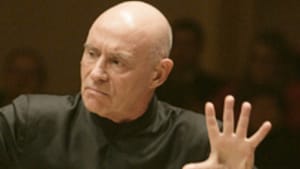Stay in the Loop
BSR publishes on a weekly schedule, with an email newsletter every Wednesday and Thursday morning. There’s no paywall, and subscribing is always free.
Coming soon:
Three spring concerts to die for
DAN COREN
In addition to Christoph Eschenbach’s readings of the Schubert Eighth and Ninth Symphonies (May 15-17), three other imminent Philadelphia concerts deserve special mention.
On May 4th and 5th, Ignat Solzhenitsyn will conduct the Chamber Orchestra of Philadelphia, taking the piano solo in the Mozart 21st Concerto and conducting the Beethoven Sixth Symphony. It’s hard for me to imagine a more attractive program. The Sixth is my favorite Beethoven Symphony (that is, on the days when it supplants the Fourth), and the 21st Concerto shows Mozart at the very peak of his powers, both as a composer and pianist.
The Chamber Orchestra, as my BSR colleague Tom Purdom pointed out just this week, has become one of Philadelphia’s civic treasures. I’m especially intrigued by the idea of hearing how a small orchestra handles this, the lushest and most sensuous of the Beethoven Symphonies. May 4-5 at Perelman Theater, Kimmel Center. (215) 893-1709 or www.chamberorchestra.org.
Mahler, once-or-twice-in-a-lifetime
On the same weekend (May 1-3), Eschenbach will conduct the Philadelphia Orchestra in Mahler’s Eighth Symphony. This is a once-or-twice-in-a-lifetime opportunity to hear Mahler’s most grandiose work.
I must say I approach that concert with a certain amount of ambivalence. Even though I’m a great Mahler devotee, I hardly know this work. My slight acquaintance with it leads me to believe it may be more of a monstrous spectacle than great music. It will, if nothing else, probably be Inquirer critic Peter Dobrin’s last chance to pillory Eschenbach’s reading of a Mahler symphony. May 1-3, Verizon Hall, Kimmel Center, (215) 893-1900 or www.philorch.org.
Sex, booze and Carmina Burana
Finally, let me recommend the performance of Carl Orff’s Carmina Burana on April 25th at Irvine Auditorium by the University of Pennsylvania Orchestra and Choral Society, conducted by Brad Smith– a performance I’ll participate in as a member of the Penn Choral Society.
In reviewing another recent performance of Carmina Burana, Tom Purdom remarked that its text “is an expression of medieval pessimism.” Having spent the last semester rehearsing the work, I must disagree. For the most part, the work deals with the perennial pleasures of getting laid and getting drunk, with more emphasis on the former. It is, for the most part, a hilarious work.
Carmina Burana looks pretty easy on the page but turns out to be fiendishly difficult. It’s not so much the notes themselves; they really aren’t all that hard. The test of any chorus isn’t learning the notes; in fact, any decent chorus (and we’re pretty good) learns the notes of most music in relatively few rehearsals. The true tests for a chorus are pure vowel sounds, cleanly synchronized consonants (synonymous with rhythmic accuracy) and, especially in this work, observing Orff’s extremely detailed dynamics and articulations. So this time around (I’ve performed in Carmina Burana once before), I’ve learned to give Orff the respect he deserves. More than respect: the sheer exuberance of this music gets more exhilarating with each rehearsal.
The Penn Orchestra is one of Philadelphia’s most unjustly overlooked musical resources. In my 40-odd years in choruses, I’ve sung under many great choral conductors. William Parberry, the conductor of Penn’s choral groups (and, I must disclose, a close personal friend), is among the best. This, I hope, will be a performance worth attending. April 25, 8 p.m., Irvine Auditorium, 34th and Spruce Sts., (215) 898-7544 or www.sas.upenn.edu/music/performance/ensembles/orchestra.
Three spring concerts to die for
DAN COREN
In addition to Christoph Eschenbach’s readings of the Schubert Eighth and Ninth Symphonies (May 15-17), three other imminent Philadelphia concerts deserve special mention.
On May 4th and 5th, Ignat Solzhenitsyn will conduct the Chamber Orchestra of Philadelphia, taking the piano solo in the Mozart 21st Concerto and conducting the Beethoven Sixth Symphony. It’s hard for me to imagine a more attractive program. The Sixth is my favorite Beethoven Symphony (that is, on the days when it supplants the Fourth), and the 21st Concerto shows Mozart at the very peak of his powers, both as a composer and pianist.
The Chamber Orchestra, as my BSR colleague Tom Purdom pointed out just this week, has become one of Philadelphia’s civic treasures. I’m especially intrigued by the idea of hearing how a small orchestra handles this, the lushest and most sensuous of the Beethoven Symphonies. May 4-5 at Perelman Theater, Kimmel Center. (215) 893-1709 or www.chamberorchestra.org.
Mahler, once-or-twice-in-a-lifetime
On the same weekend (May 1-3), Eschenbach will conduct the Philadelphia Orchestra in Mahler’s Eighth Symphony. This is a once-or-twice-in-a-lifetime opportunity to hear Mahler’s most grandiose work.
I must say I approach that concert with a certain amount of ambivalence. Even though I’m a great Mahler devotee, I hardly know this work. My slight acquaintance with it leads me to believe it may be more of a monstrous spectacle than great music. It will, if nothing else, probably be Inquirer critic Peter Dobrin’s last chance to pillory Eschenbach’s reading of a Mahler symphony. May 1-3, Verizon Hall, Kimmel Center, (215) 893-1900 or www.philorch.org.
Sex, booze and Carmina Burana
Finally, let me recommend the performance of Carl Orff’s Carmina Burana on April 25th at Irvine Auditorium by the University of Pennsylvania Orchestra and Choral Society, conducted by Brad Smith– a performance I’ll participate in as a member of the Penn Choral Society.
In reviewing another recent performance of Carmina Burana, Tom Purdom remarked that its text “is an expression of medieval pessimism.” Having spent the last semester rehearsing the work, I must disagree. For the most part, the work deals with the perennial pleasures of getting laid and getting drunk, with more emphasis on the former. It is, for the most part, a hilarious work.
Carmina Burana looks pretty easy on the page but turns out to be fiendishly difficult. It’s not so much the notes themselves; they really aren’t all that hard. The test of any chorus isn’t learning the notes; in fact, any decent chorus (and we’re pretty good) learns the notes of most music in relatively few rehearsals. The true tests for a chorus are pure vowel sounds, cleanly synchronized consonants (synonymous with rhythmic accuracy) and, especially in this work, observing Orff’s extremely detailed dynamics and articulations. So this time around (I’ve performed in Carmina Burana once before), I’ve learned to give Orff the respect he deserves. More than respect: the sheer exuberance of this music gets more exhilarating with each rehearsal.
The Penn Orchestra is one of Philadelphia’s most unjustly overlooked musical resources. In my 40-odd years in choruses, I’ve sung under many great choral conductors. William Parberry, the conductor of Penn’s choral groups (and, I must disclose, a close personal friend), is among the best. This, I hope, will be a performance worth attending. April 25, 8 p.m., Irvine Auditorium, 34th and Spruce Sts., (215) 898-7544 or www.sas.upenn.edu/music/performance/ensembles/orchestra.
Sign up for our newsletter
All of the week's new articles, all in one place. Sign up for the free weekly BSR newsletters, and don't miss a conversation.

 Dan Coren
Dan Coren
